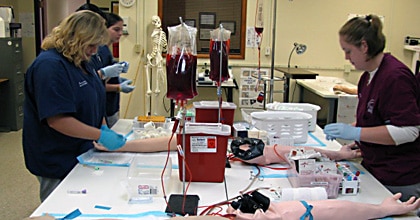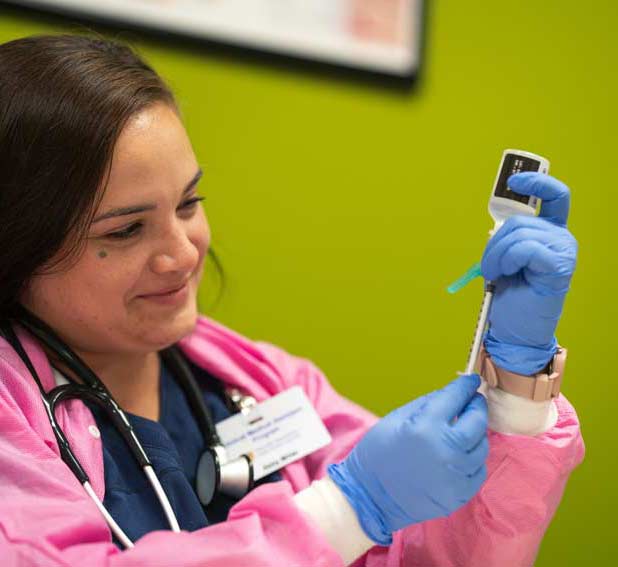Phlebotomy school: What Comes Next
Phlebotomy school: What Comes Next
Blog Article
The Course to Qualification: Understanding the Phlebotomy Training Course Journey and Its Significance
As you think about the course to accreditation in phlebotomy, it is essential to recognize the duty you'll play in medical care. Your training will certainly cover essential skills, from blood collection techniques to patient interaction. Each component of the program prepares you for the challenges ahead. But just what does the journey entail, and why is certification so important for your future profession? Allow's check out these inquiries better.

The Function of Phlebotomists in Healthcare
Phlebotomists play a crucial function in the healthcare system, working as the essential web link between people and necessary diagnostic screening. You'll perform blood attracts, guaranteeing examples are collected precisely and safely. Your know-how helps in identifying clinical conditions, keeping an eye on health, and assisting treatment decisions.
In your day-to-day interactions, you'll need to develop trust with individuals, making them really feel comfortable throughout what may be a difficult experience. You are in charge of labeling and managing examples carefully to stop contamination or mistakes, which could impact examination outcomes.
Past this, you'll usually function along with medical professionals and nurses, communicating vital info regarding clients' conditions. By mastering your skills, you contribute meaningfully to patient treatment, making you a crucial component of the clinical group.
Introduction of Phlebotomy Training Programs
When checking out phlebotomy training programs, you'll discover various types made to fit various timetables and discovering styles. Each program helps you develop essential abilities like blood collection and individual interaction. Comprehending these options is vital to selecting the ideal path for your career.
Kinds of Educating Programs
Several types of training programs are readily available for those seeking to end up being competent in phlebotomy. You can select from certification programs, which normally last a few months and concentrate on crucial skills. There are also diploma programs that give a more comprehensive education and learning, usually lasting approximately a year. If you're trying to find a much deeper understanding, an associate degree in an associated area could be the best fit. Online training courses use flexibility for those balancing work or family dedications, allowing you to research at your own rate. Additionally, some health centers and centers offer on-the-job training programs, supplying practical experience while you discover. Whatever course you pick, each program aims to outfit you with the required abilities for an effective phlebotomy profession.

Trick Abilities Created
Mastering phlebotomy calls for a set of key abilities that are developed with detailed training programs. Additionally, communication abilities are essential; you'll need to connect with clients, explain treatments, and put them at convenience. Each of these skills is crucial for your success as a licensed phlebotomist, making you a valuable possession in any health care setting.
Secret Components of a Phlebotomy Training Course
In a phlebotomy course, you'll concentrate on important subjects that prepared for your future profession. You'll participate in hands-on training that allows you to use what you have actually discovered in real-world setups. Both the core curriculum and functional experience are vital for your success as a phlebotomist.
Core Curriculum Review
While pursuing a phlebotomy training course, you'll run into a core curriculum developed to outfit you with fundamental skills and expertise. Phlebotomy Courses Near Me. This curriculum usually consists of makeup and physiology, focusing on the circulatory system and comprehending blood parts. You'll additionally learn around various sorts of blood collection approaches, including venipuncture and capillary puncture techniques
In addition, infection control and safety and security methods are crucial elements, ensuring you know just how to preserve a sterilized environment. You'll research patient communication, highlighting interaction and compassion, which are important for alleviating client anxiety.
Hands-On Training Experience
Obtaining hands-on experience is a crucial component of your phlebotomy training course. This sensible training permits you to apply what you've found out in a real-world setting, enhancing your abilities and confidence. You'll like it exercise venipuncture methods, learn exactly how to take care of different kinds of samplings, and obtain aware of the tools utilized in the area. Under the advice of knowledgeable instructors, you'll improve your skills, guaranteeing you're gotten ready for any kind of circumstance you might deal with.
Furthermore, you'll obtain the chance to interact with individuals, which is essential for establishing your interaction skills. This combination of technological proficiency and interpersonal abilities is critical for your success as a licensed phlebotomist. Inevitably, hands-on training is where theory satisfies technique, solidifying your understanding and preparedness for certification.
Certification and Licensing Demands
Prior to you can start your profession in phlebotomy, it is crucial to comprehend the certification and licensing requirements that vary by state. A lot of states call for phlebotomists to hold a certification from an acknowledged organization, such as the National Phlebotomy Organization or the American Culture for Professional Pathology. These certifications generally include passing an examination that examines your expertise and abilities in the area.
Along with certification, some states have particular licensing demands. You may need to complete a particular variety of hours in professional technique, send evidence of training, or undertake a history check. It is essential to investigate your state's laws to make certain you fulfill all essential standards.
Staying informed about these requirements not only aids you secure a setting yet likewise boosts your reliability as a specialist. By satisfying these demands, you'll be well on your method to an effective job he has a good point in phlebotomy.
Hands-On Training and Practical Experience
Hands-on training and practical experience are vital components of your phlebotomy education, as they allow you to apply academic expertise in real-world scenarios. During your training, you'll take part in supervised venipuncture, discover proper strategies, and come to be aware of various blood collection tools. This direct involvement is critical for constructing your confidence and honing your abilities.
You'll work closely with seasoned experts who can lead you via the subtleties of client communication and sample handling. Each practice session not just reinforces your understanding yet likewise prepares you for the fast-paced atmosphere of healthcare setups.
In addition, numerous programs include medical rotations, permitting you to experience diverse setups, from healthcare facilities to outpatient clinics. This direct exposure helps you adapt to different obstacles and patient requirements, guaranteeing you're well-prepared for your future function. Welcome these chances, as they're essential to ending up being a skilled and thoughtful phlebotomist.
Challenges Encountered During Training
While acquiring hands-on experience is necessary, it's vital to recognize the challenges that can occur during your phlebotomy training. Furthermore, understanding the skills required for blood draws takes practice; you may struggle with technique initially.
Time administration can likewise be an obstacle, as balancing theory, useful sessions, and individual dedications can really feel challenging. You may deal with varying discovering paces among your peers, leading to feelings of insecurity if you assume you're falling behind. Adapting to the various individualities of teachers can be tough, as each might have a special mentor style.
Identifying these barriers beforehand can prepare you for success and aid you establish durability throughout your training journey.
Job Opportunities After Qualification

As you obtain experience, you may also consider focusing on locations like pediatric or geriatric phlebotomy, satisfying specific client demands. Some phlebotomists choose to advance their jobs by becoming research laboratory service technicians or seeking further education in medical care areas.
Additionally, your accreditation can bring about roles in training or monitoring brand-new phlebotomists, permitting you to share your knowledge. With the health care sector continually growing, your skills will certainly constantly remain in demand, leading the way for a stable and satisfying occupation. Welcome the possibilities awaiting you!
Frequently Asked Concerns
What Is the Common Period of a Phlebotomy Training Course?
Phlebotomy training courses normally last around Discover More Here 4 to eight weeks. You'll participate in hands-on practice, classroom instruction, and on the internet understanding. Completing this training prepares you for qualification and a rewarding profession in healthcare.
Are Online Phlebotomy Courses Available?
Yes, on the internet phlebotomy courses are offered. They supply adaptability and benefit, enabling you to research at your own pace. Simply verify the program is approved to fulfill qualification needs and gain valuable skills for your profession.
Just How Much Does Phlebotomy Training Usually Expense?
Phlebotomy training usually costs between $700 and $2,500, relying on the program and area. You must think about factors like course size, consisted of materials, and hands-on experience when choosing the right training for you.
What Are Usual Prerequisites for Phlebotomy Training?
Common requirements for phlebotomy training frequently consist of a secondary school diploma or GED, booster shots, and a background check. Some programs might also call for fundamental medical care understanding or certifications, ensuring you're planned for hands-on training.
Can I Work While Finishing My Phlebotomy Training?
Yes, you can work while finishing your phlebotomy training. Many trainees equilibrium jobs with their studies, yet make sure to handle your time effectively to ensure you fulfill both work and training dedications efficiently.
Report this page